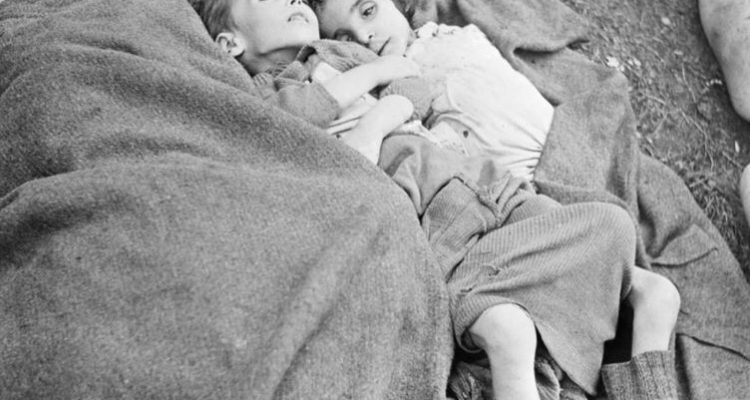In a different era, when Jewish children were the ones being separated from their parents, it was the opponents of immigration who protested.
By Rafael Medoff
This isn’t the first time that the separation of children from their would-be immigrant parents has been at the center of public debate in America. But when it happened during the Roosevelt administration, it was the opponents of immigration who were the ones complaining about separating them.
That debate began in the wake of the devastating Kristallnacht pogrom in November 1938, in which nearly 100 German Jews were murdered, several hundred synagogues were destroyed, and thousands of Jewish businesses were damaged. In response, Senator Robert Wagner (D-New York) and Rep. Edith Rogers (R-Massachusetts) introduced legislation to admit 20,000 German children outside America’s regular immigration quotas.
Although the bill did not specify that the children would be Jewish, it was widely understood that all, or nearly all, of them would be. The age cut-off was 14. Anne Frank, who was then 10 years old, and her sister Margot, 13, could have qualified.
The Wagner-Rogers bill attracted support from a broad coalition. Prominent clergymen, labor leaders, university presidents, actors such as Henry Fonda and Helen Hayes, and political figures such as 1936 Republican presidential nominee Alf Landon and his running mate, Frank Knox. Former First Lady Grace Coolidge announced that she and her neighbors in Northampton, Massachusetts, would personally care for 25 of the children.
Unexpected support came from former President Herbert Hoover. Back in 1930, before the rise of Hitler, Hoover’s administration had tightened the restrictions on immigration. Now Hoover not only endorsed Wagner-Rogers, but also pressured wavering members of the House Immigration Committee to support the measure.
Patriotic and anti-foreigner groups, such as the American Legion and the Daughters of the American Revolution, mobilized against Wagner-Rogers. Laura Delano Houghteling, a cousin of President Franklin Roosevelt and wife of the U.S. Commissioner of Immigration, summarized the sentiment of the opposition when she complained that “20,000 charming children would all too soon grow up into 20,000 ugly adults.”
‘File No action FDR’
First Lady Eleanor Roosevelt privately supported the legislation, but declined to publicly endorse it. The president, for his part, took no position on Wagner-Rogers. When a congresswoman inquired as to Roosevelt’s stance, he returned her note to his secretary marked “File No action FDR.”
In April 1939, a joint Senate-House committee held four days of hearings on the Wagner-Rogers bill. Sympathetic witnesses offered moving humanitarian pleas. They also stressed that the children would not compete with American citizens for jobs—a widespread concern during the Depression era.
Nativists presented a variety of arguments against Wagner-Rogers: American children deserved priority; foreign children might be Communists or even Nazis; admitting the children would pave the way for admission of their parents.
One of the most remarkable arguments that opponents invoked was that by separating the children from their parents, Congress would in effect be tearing the families apart. The first witness to testify against the bill was Francis H. Kinnicutt, president of the Allied Patriotic Societies. He piously proclaimed that “children should not be separated from their parents…Foster parentage or institutional bringing up is prejudicial to children.”
Mrs. Agnes Waters, a World War I widow claiming to speak for millions of patriotic American women, testified that if German Jewish children were separated from their mothers, then America would find itself saddled with “thousands of motherless, embittered, persecuted children of undesirable foreigners” who, as “seasoned veterans for a revolution of hate,” would grow up to be “potential leaders of a revolt against our American form of government.”
Of course, under normal circumstances, German Jewish parents never would have willingly sent their young children abroad. But in 1939, in the wake of Kristallnacht, sending their children away seemed to be the only way to save their lives. In fact, at that very moment, the parents of some 10,000 German Jewish children were sending them to England on the famous Kindertransports.
Jewish children shunned, British children accepted
In the face of bitter nativist opposition and the absence of support from the president, the Wagner-Rogers bill never made it out of committee.
President Trump has expressed a preference for immigrants from Norway. President Roosevelt, for his part, preferred Great Britain. A year after he refused to support admission of Jewish children fleeing the Nazis, FDR—who once privately expressed relief that he had “no Jewish blood” in his veins—rushed to admit thousands of British children fleeing the Nazi Blitz. Needless to say, nobody complained that those kids were being unwillingly separated from their parents, or that motherless British children might seek to harm America.
Dr. Rafael Medoff is founding director of The David S. Wyman Institute for Holocaust Studies and author of The Jews Should Keep Quiet: President Franklin D. Roosevelt, Rabbi Stephen S. Wise, and the Holocaust, forthcoming from The Jewish Publication Society in 2019. This article was first published in the Baltimore Jewish Times.





